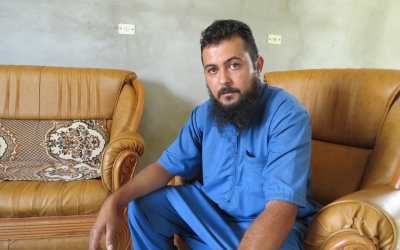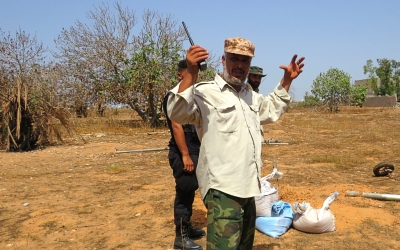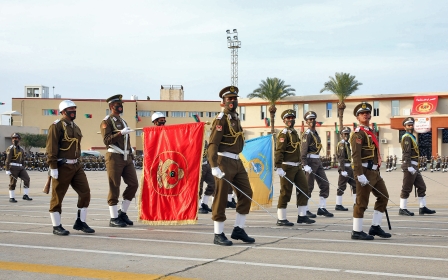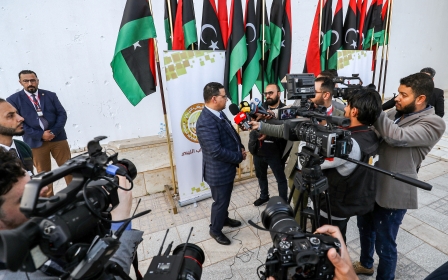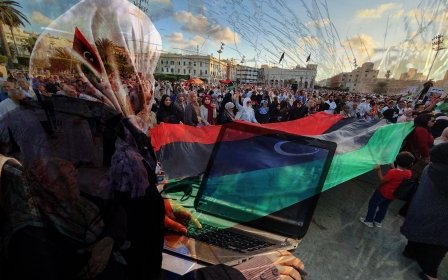UN Libya report: Key takeaways, from mercenaries and Erik Prince to murders
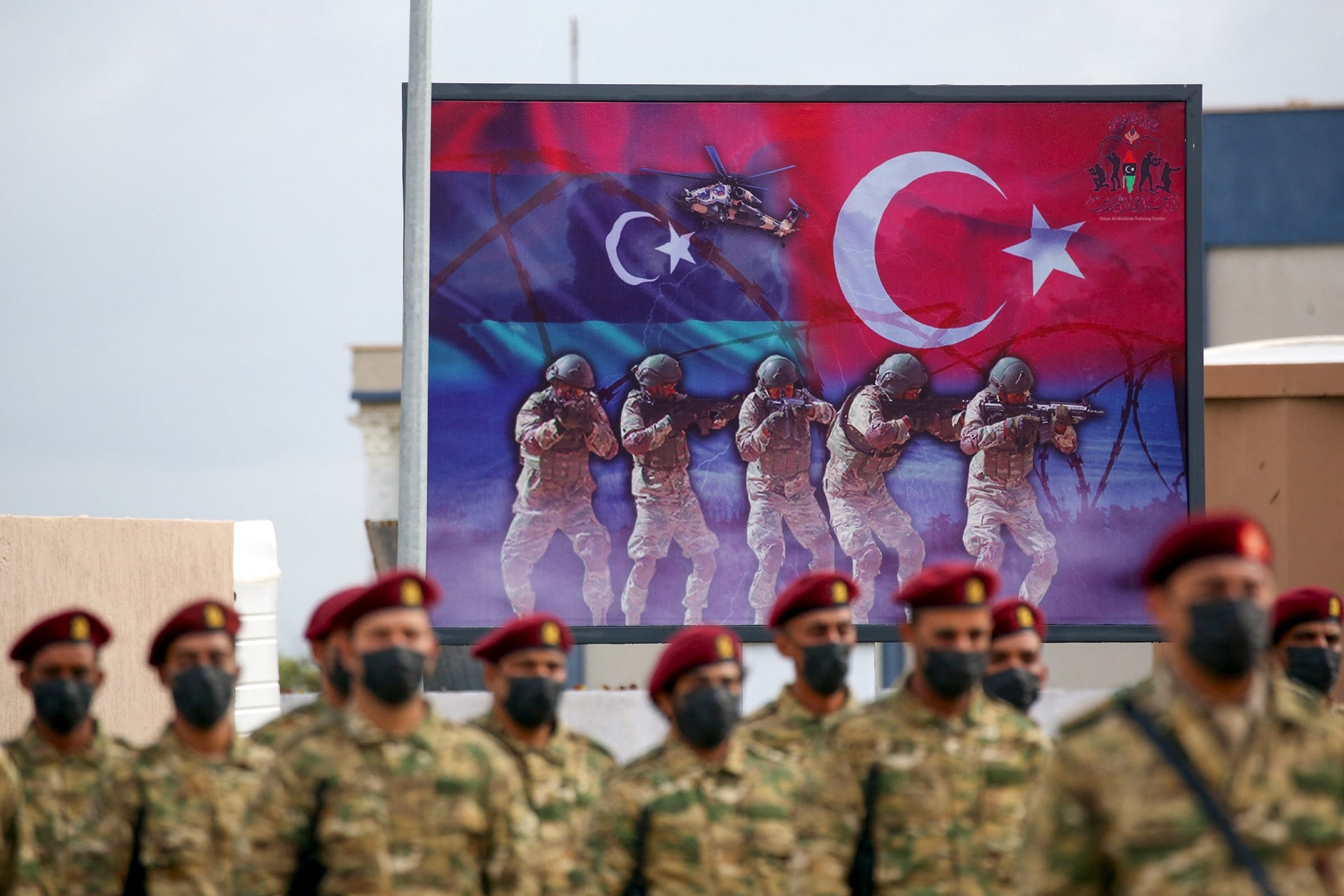
After a series of leaks to the international media, a report on Libya by a panel of United Nations experts has been published this week.
The report contains allegations of vote-buying during the UN-led peace talks, which threatened to derail Libya's interim government when they were leaked before it had been sworn in by parliament. Nevertheless, Prime Minister Abdul Hamid Dbeibah secured enough votes on 10 March.
Elsewhere, there are revelations on the continuing involvement of foreign mercenaries and the blatant disregard of the UN arms embargo by various regional powers backing Libyan factions.
Middle East Eye takes a look at some of the most interesting elements found in the UN experts' latest report.
'No withdrawal' by mercenaries
New MEE newsletter: Jerusalem Dispatch
Sign up to get the latest insights and analysis on Israel-Palestine, alongside Turkey Unpacked and other MEE newsletters
Under the UN-brokered ceasefire deal signed in October last year, foreign troops and mercenaries were mandated to pull out of Libya within three months.
However, the latest report has found that four months later there has been little movement. Around 2,000 mercenaries employed by the Russian Wagner Group are still on the ground in the country, and there had been been "no indications of any withdrawal" by the group.
The Wagner Group has been fighting on the side of eastern commander Khalifa Haftar.
As many as 13,000 fighters from Syria, including at least 200 minors, have also fought on both sides in the conflict, while mercenaries from Chad and Sudan - some of whom were trained by the UAE according to the report - have also been fighting on Haftar’s side.
Regular violations of embargo
The embargo placed by the UN on Libya in 2011 was described by the report as "totally ineffective", citing the regular involvement in the conflict by numerous foreign actors.
The report said it found violations by Egypt, Russia, Jordan, Syria, Turkey and the UAE, who they said were responsible for transferring drones and transport aircraft, mercenaries, surface-to-air missiles, artillery pieces and armoured vehicles to factions in Libya.
It said that for "those member states directly supporting the parties to the conflict, the violations are extensive, blatant and with complete disregard for the sanctions measures".
"Their control of the entire supply chain complicates detection, disruption or interdiction... make any implementation of the arms embargo more difficult."
Erik Prince tried to help Khalifa Haftar
The report says American private military contractor Erik Prince, an ally of former US president Donald Trump, tried to help Haftar in his April 2019-June 2020 offensive against the Government of National Accord, and "at the very least" is guilty of violating the arms embargo on Libya.
The investigation found that Prince, best known as the founder of private military company Blackwater, pumped $80m in weapons and fighters into eastern Libya, with assets including mercenaries, aircraft and cyberwarfare technology. Prince's operation included plans to form a hit squad to track and kill Libyan commanders opposed to Haftar, the report says, including some who were also European Union citizens.
The report says that Project Opus, one facet of Prince's Libya operation, aimed to “kidnap or terminate individuals regarded as high value targets in Libya".
Though Prince has denied the allegations - and the report notes the experts were unable to reach him - the experts conclude that he had "at the very least... assisted in the evasion of the provisions of the arms embargo in Libya".
Jordanian officials kicked out Prince
The report reveals that Prince at one point attempted to deploy equipment to Libya from Jordan before the government got suspicious.
It notes that it was "clear that Erik Prince has been attempting to deploy a small scale aviation and maritime private military capability into Libya since 2013", and that "air ammunition, ground weapons, ground ammunition and night vision" had originally been set for travel from the country to the eastern Libyan city of Benghazi.
"The Panel has confirmed with a senior military officer in Jordan that the activities of the Project Opus team in Jordan raised suspicions at the highest levels of the Jordanian Armed Forces as to the legitimacy of the operation," the report reads.
The military officer mentioned met with Prince's associate Christiaan Durrant, who introduced himself as "Gene Rynack", a name adapted from a character played by Mel Gibson in the film Air America.
Durrant claimed he had "clearances from everywhere" and that the operation was cleared at the "highest level", the report says, but the officer did not believe him and eventually he and his associates were asked to leave the country with their equipment in 2019.
A section on bribery is listed as 'confidential'
One annex of the report titled Bribery attempts at the Libyan Political Dialogue Forum is blanked out with only the words "CONFIDENTIAL ANNEX NOT FOR PUBLIC DISSEMINATION" written.
The Libyan Political Dialogue Forum (LPDF) was launched in November 2020 as a series of meetings set to lead the country towards democratic elections.
Dbeibah called on the UN in early March to make public allegations of vote-buying in the LPDF, whose 75 UN-picked delegates in February selected him and a three-member council to steer the country towards new parliamentary elections.
Sudanese and Chad paramilitaries and mercenaries rife
Chadian and Sudanese armed groups are still present on the ground in Libya, including many affiliated with opposition and paramilitary groups.
Chadian opposition groups the Military Command Council for the Salvation of the Republic and the Front for Change and Concord in Chad - both factions committed to overthrowing the ruling government in N'Djamena - are active in Libya. The former is primarily located around the border area and has "declared its neutrality", according to the report, and the latter is backing Haftar.
The report also noted the presence of the Sudanese Rapid Support Forces (RSF), a controversial paramilitary group, saying it had around 700 fighters deployed for a few months in 2019.
"On their return, the fighters were instructed to remain silent about their deployment," says the report.
"Since then, there have been media reports on a leaked document that suggests a more recent Rapid Support Forces presence in Libya. The Panel can discount these reports as inaccurate or fabricated."
Turkish weapons turned the tide for the GNA
The report describes the November 2020 introduction of advanced Turkish weaponry into the conflict on the side of the UN-recognised GNA as a "decisive element" in helping defeat Haftar's military advance.
"Remote air technology, combined with an effective fusion of intelligence, surveillance and reconnaissance capability, turned the tide for [the GNA] in what had previously been a low-intensity, low-technology conflict in which casualty avoidance and force protection were a priority for both parties to the conflict," says the report.
It added that the introduction of Turkish air power meant that "the local air superiority of [Haftar] was thus effectively negated early in 2020, allowing for an unchallenged build-up of military materiel through western Libyan ports and airports by Turkey" in support of the GNA.
Sudanese recruited as security guards in UAE sent to Libya
According to the report, 611 Sudanese nationals were recruited in early September 2019 by an Emirati company, Black Shield Security Services, under the "false pretences" that they would be working as security guards in the UAE.
Citing samples documents reproduced in the report, the experts said the men received military training in Al-Ghayathi camp in the UAE "under the supervision of Emirati officers".
"On 22 January 2020, a batch of 276 Sudanese recruits were transported to Libya, unbeknownst to them, where they were tasked by the 302nd battalion of [Haftar] to protect oil installations in Ra’s Lanuf. They never deployed to the field," they said.
"Following their protests, they were withdrawn from Libya after six days."
Forced expulsions, killings and kidnappings
Various armed groups were involved in the abuse of civilians, including activists, with little oversight.
The experts cited testimony from victims explaining how the Haftar-aligned al-Saiqa had forcibly expelled civilians from their houses in Benghazi.
"Victims recounted to the Panel how armed men had stormed their houses, ordering the residents and their children, under the threat of death, to vacate overnight," they said.
They also referenced the killing of lawyer Hanan al-Baraasi, who "was shot to death in broad daylight while driving her car in a major street in Benghazi" in November 2020.
Middle East Eye delivers independent and unrivalled coverage and analysis of the Middle East, North Africa and beyond. To learn more about republishing this content and the associated fees, please fill out this form. More about MEE can be found here.


